Hi ! We hope this site helps you! ٩(ˊᗜˋ*)و As an Amazon Associate, we earn from qualifying purchases without additional cost. Click to read more about our Privacy Policy or Affiliate Disclosure
The Curious Case of Particle WA and GA
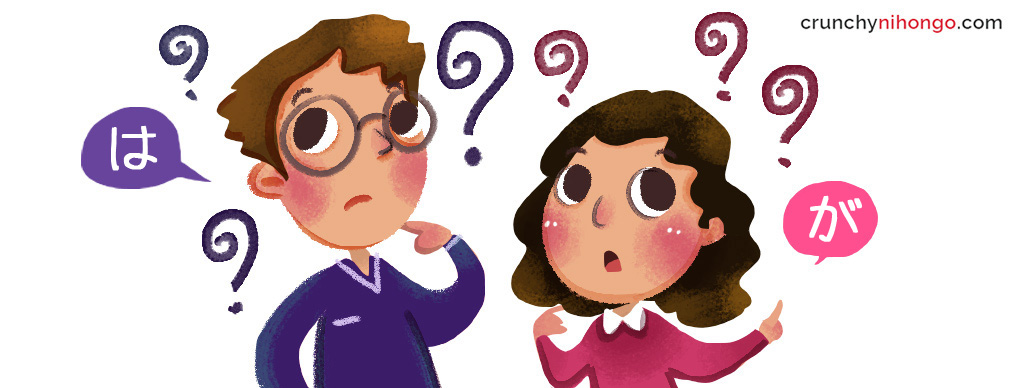
In the process of learning Japanese, almost all people got confused as to how to differentiate when to use particle WA and GA in a sentence. Below we will try to give you a few tips as to how to differentiate them and understanding the reason by giving you case, completed with thorough explanations!.
This is actually a very famous questions. And you shouldn’t worry to much about this since even native themselves cannot explain well as to how both particle GA and WA is different.
To perfectly differentiate it requires a very advanced knowledge of a Japanese linguist. There is even a whole book created just trying to explain the difference between particle WA and GA. Imagine that!
But don’t get discouraged!
Because we will give you a few tips which will help you to understand the reason as to how they are different and thus help you to differentiate particle wa and ga in the usage. We try our best to write out the complex material as simple as possible. We hope that it will help you to grasp the concept much easier.
Note this guide is ‘somewhat’ ultimate because what mentioned here is not the full list of cases (because it will be very complex and there are already a book for that), but we try to cover all common cases that you might stumble upon.
Useful notes As information, in a case where WA and GA seem interchangeable, it usually doesn’t change the meaning very much and will still be understandable. In learning language,it is not necessary to perfectly master the grammar. The most important thing is being able to understand the language and able to convey the message you want! So don’t overthink about this matter and enjoy learning!
Okay then, let’s start! ☆*:.。. o(≧▽≦)o .。.:*☆
…………………………………………
First things first!
We want to make sure that you understand about topic! It’s basically what the sentence is all about, and it’s marked by particle は. You could click the link below to learn the characteristic of a topic (what can and cannot be a topic) and particle は.
Related • Japanese Particle: Topic Marker Particle は
We won’t be talking about particle が which function is to connect contrastive sentence (similar like ‘but’ in English). If you haven’t heard about this, I recommend you to check this link below which talk about common & basic use of particle が.
Related • Japanese Particle: が
We hope that you already know that particle が is always being used DIRECTLY AFTER questions words such as NANI/DARE/etc. If you don’t know about this, we recommend you to check out the link below that review all about questions. But we will cover about the subtle difference in using WA/GA for questions in this article.
Related • Japanese Particle か and All About Questions
And last, we won’t be talking about particle が which sometimes being used to replace particle を when we want to connect intransitive verbs such as ‘FURU’ (fall as in rain) or ‘WAKARU’ (understand). If you want to know why, check out this link below.
Related • Japanese Particle: を
…………………………………………
So what will we be talking about then ?
Now, now… Above part is the basics rules of WA and GA, and it is necessary that you understand the basic before we move one to review more advance situations.
What we will talking about is common cases in which particle GA and WA seems as if it is interchangeable but have a subtle difference in meaning. And common cases in which particle が is recommended for some word (such as suki / hoshii) but then we found that someone use は but it turns out to be correct anyway, which might confuse you.
…………………………………………
Case & Explanations A: When Particle WA and GA seems interchangeable
…………………………………………
Particle WA or GA Case 1: Subtle difference when used in Questions
A: Sakura-san WA dono hito desuka?
Reply: Sakura-san WA ano hito desu.
B: Dono hito GA Sakura-san desuka?
Reply:Ano hito GA Sakura-san desu.
When using WA / GA for the questions, notice that the formula is changed.
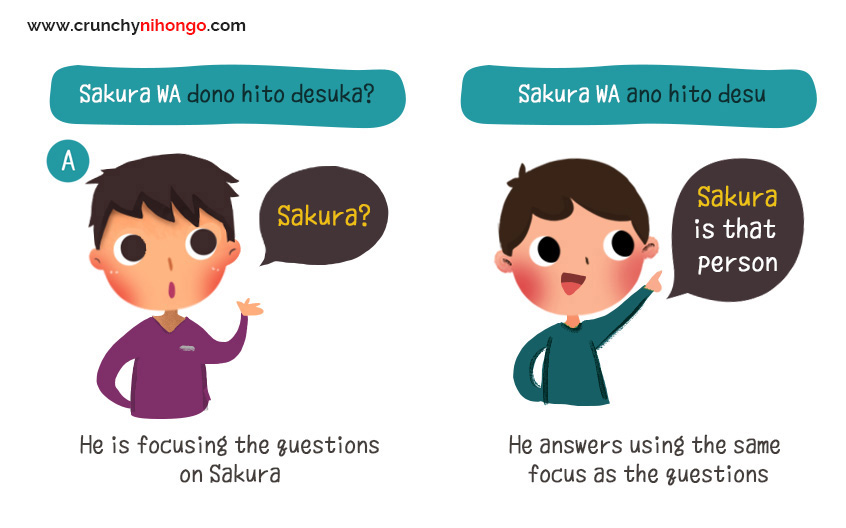
With WA,you mention what you want to ask about for details, and the questions word is put in the back. Literally you’re saying “About Sakura… Which person is she ?”
Therefore the reply is focusing on Sakura. “About Sakura, she is that person.”
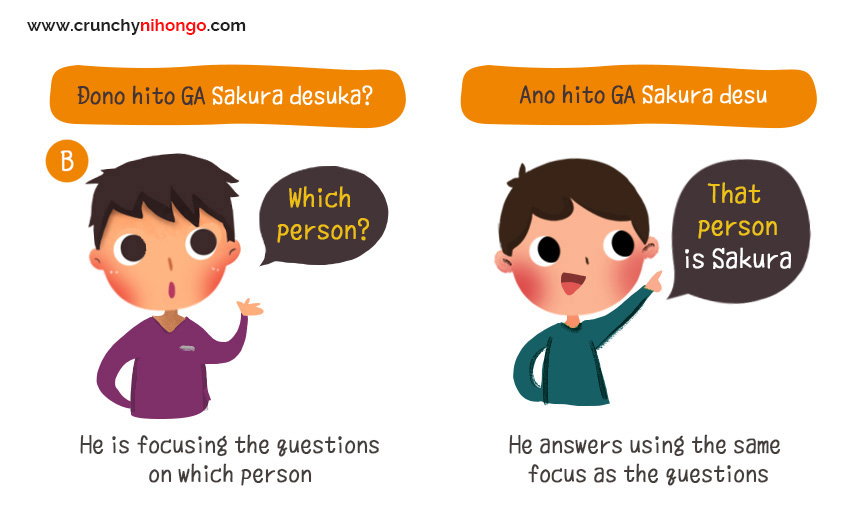
With GA, you start with the questions words first. And in this case you will always need to use GA. “Which person is Sakura?”
The reply is focusing to the person who is Sakura. “That person is Sakura”
…………………………………………
Particle WA or GA Case 2: Subtle difference in meaning of sentence
Example A: Difference in scope
A: Onna no ko WA totemo kawaii desu.
B: Onna no ko GA totemo kawaii desu.
*Onna no ko means little girl, Totemo kawaii means very cute
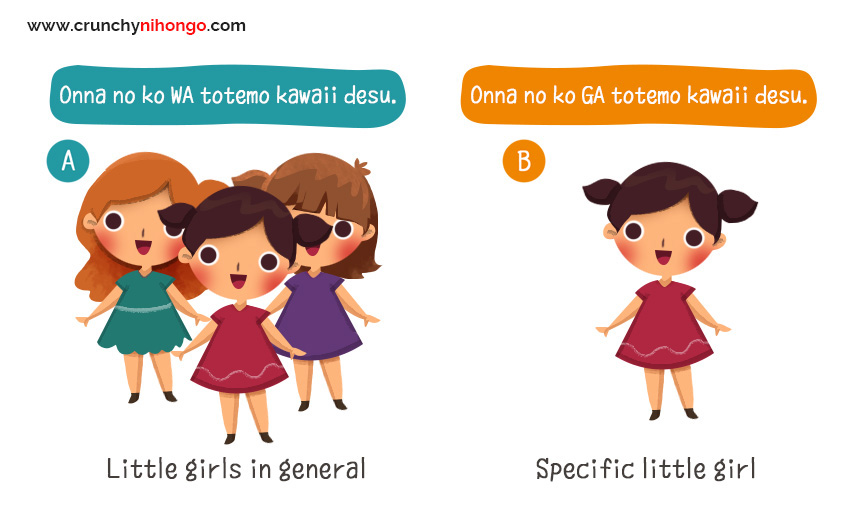 In A, it means that you talk about little girls in GENERAL. The scope is very big. Literally, it translates as “About little girls, they are very cute.”
In A, it means that you talk about little girls in GENERAL. The scope is very big. Literally, it translates as “About little girls, they are very cute.”
In B, the scope is much smaller. In fact the scope only affect one little girl! The case is that you mention a specific very cute little girl (which name you might not know) instead of little girl in general. It translate as “The little girl is very cute.”
Useful notes Note that in A, we translate it as THEY (plurals), while in B we translate it as singular (just one little girl) ! Japanese has no plurals, but in the English translations, you can see A & B difference in scope.
Example B: Subtle difference in meaning
A: ••• hazu WA nai
B: ••• hazu GA nai
*Hazu means expectation of something
In A, it’s literally “About expectation, there is none”. The ‘nai’ negate the existence of expectation. So it have the same meaning as in “Impossible/There’s no way that it can happened”.
While in B, it’s literally “Expectation is not there”. So the meaning change a bit into “Something is not expected” or “I have no expectation that it can happened”. As in “I don’t expect him to be so smart”. While in A, the meaning is “There’s no way that he can be that smart”
…………………………………………
Particle WA or GA Case 3: Focus of sentence
…………………………………………
Example A: Basic case
A: John WA sakana o tabeteimasu
B: John GA sakana o tabeteimasu
*Sakana is fish while tabeteimasu means “is eating”
In A, the sentence is flexible. The scope is big, and there are a lot of possibility to be added after the sentence to tell more information. You use A when you want to talk about John, what he is doing, and more. OR you could make it as a comparative WA, to compare John with someone else. The focus is in “About John…”
When to use B ? You use B when you just want to say that “John is eating fish” and just that! Usually it’s being used to answer questions that focusing on John. Like… “What is John doing now?” The focus is in the whole sentence “John is eating fish”.
It might also helpful to see the illustration below.
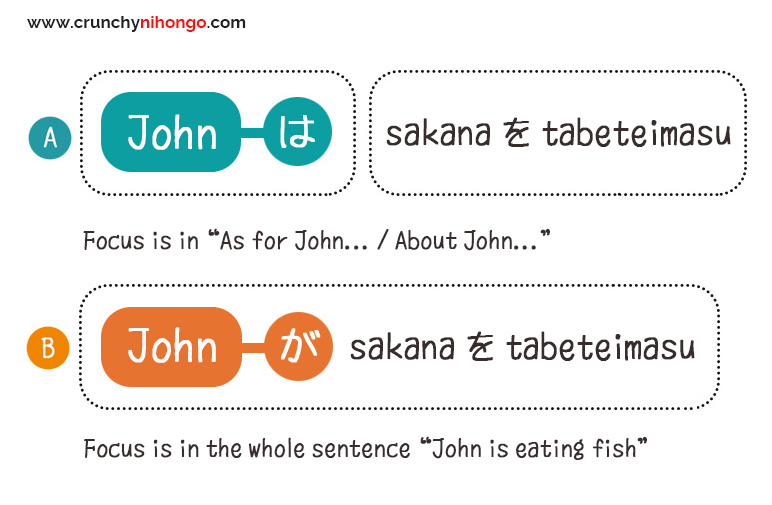
As you can see picture, the WA is flexible, both block is separated. It is okay to put “John WA” on the back of “Sakana o Tabeteimasu”. But for GA, it’s totally fixed. You cannot juggle it, it’s a whole set. That is why the focus of A is about John, while focus in B is what the sentence is describing, which is “John eating fish”.
…………………………………………
Example B: A more complex case
A: Watashi WA nihonjin desu.
B: Watashi GA nihonjin desu.
*Watashi means I, Nihonjin means Japanese
In A, you make watashi as the topic of sentence. Literally, it says that “About me, I am Japanese”. The focus of the sentence is describing yourself.
In B, it has a subtle difference. Literally, you say that “I am the one who is Japanese”. The focus of the sentence is the fact that you are Japanese.
How to use it?
The situation explained below should be able to give you more understanding about this case. Imagine that you want to ask the people in your group to see which of them are Japanese and ask “Who is Japanese here?”.
If there is only one Japanese…, he might pick B.
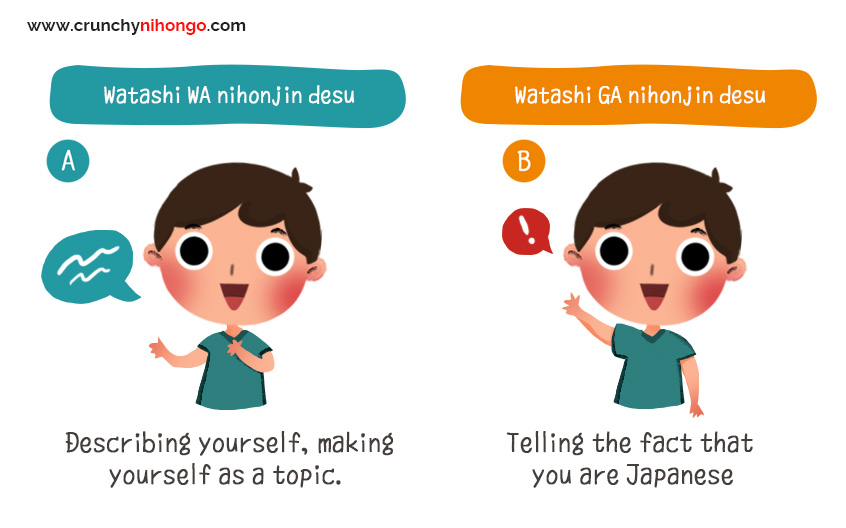
Useful notes Why he says B if he thought that he is the only one who is Japanese?
The focus of WATASHI WA is “About me”. He will think it might be strange that if someone ask “Who is Japanese here?” , but he answers as if he is describing himself by making himself as topic.(No one asking information about him. It is not an introduction section,he though… They just want to know if there’s a Japanese in the group).
So by saying B, he is not describing about himself, but he is STATING A FACT.
Now, if there are two of them, the case and meaning will be a bit different.
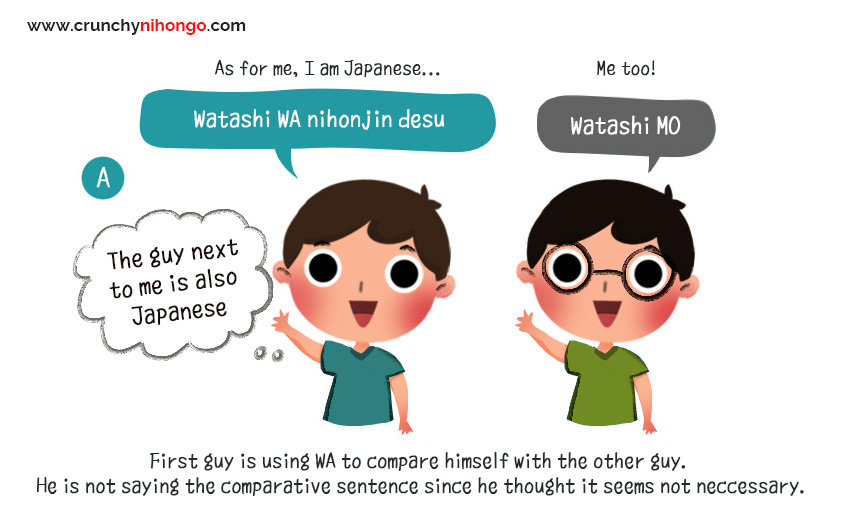
The first person might be saying “Watashi wa Nihon-jin desu” which means “About me, I am Japanese”. He is using WA because he’s comparing himself to another person. He might want to say “Watashi WA nihonjin desu. Kare MO nihonjin desu.” which literally means “As for me, I am Japanese. He is also Japanese” but he remove the comparative sentence because it seems unnecessary . The WA here is functioning as a WA which compare two or more topics.
The other guy then confirm the first guy to complete the comparative with “Watashi mo” which means “I’m also (Japanese)”.
…………………………………………
Particle WA or GA Case 4: Subtle additional information
A: John WA warui desu. (John is one of many)
B: John GA warui desu. (only John)
*Warui means bad
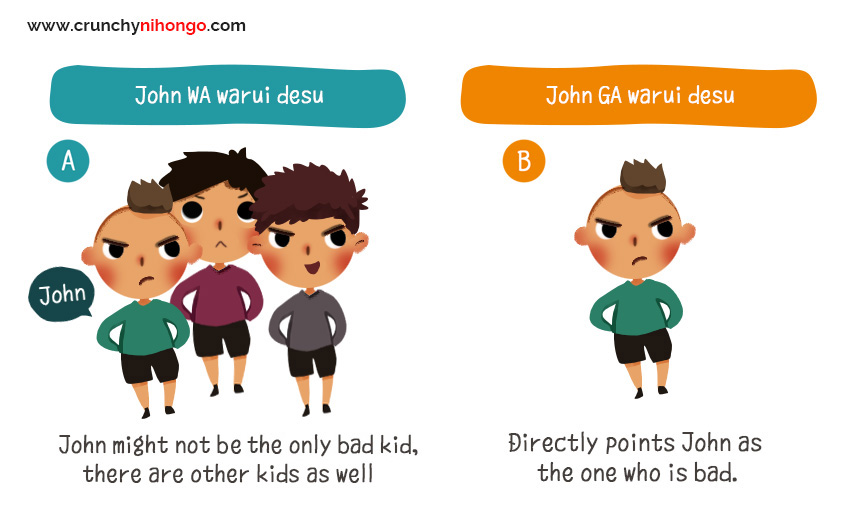 This is actually similar to case 2. Let’s say that you are a teacher in a class, and see one kid cries. You ask him what happened.
This is actually similar to case 2. Let’s say that you are a teacher in a class, and see one kid cries. You ask him what happened.
In A, the kid is saying that “About John, he is bad…” , but with using WA, he is implying that there are OTHER people who he thought also doing bad things to him.
In B, it directly only points John and no one else. It literally says “John is bad!”.
…………………………………………
Particle WA or GA Case 5: When は is being used with a verb that is recommended to be partnered with が
When learning Japanese, you will be taught to use が with some adjective/verbs such as adjective hoshii ‘want’, suki ‘like’ and verb furu ‘to fall as in rain’. This is enough for basics. But in a more advance situations, you might find that the verb is being partnered with は. And you are getting confused. Here’s the reason as to why WA can be used.
The WA actually being used to compare two or more topics.Note that most of the confusion happened because Japanese loves to remove part of a sentence which they though is obvious enough,not necessary, too rude to be mentioned, or seems to long to say (lazy, lol)…
…………………………………………
Example A :
A: Tokyo Banana WA suki desu.
B: Tokyo Banana GA suki desu.
*Tokyo banana is Japanese soft-cake with banana shape. Suki is Japanese na-adjective to describe that something is likeable.
Related • Japanese type of adjectives
For A, imagine this situation, where you offer banana to a Japanese girl. Now if she doesn’t like banana, she might say A. This is correct because the WA is being used to compare Tokyo Banana to other things, in this case, the banana you offer.
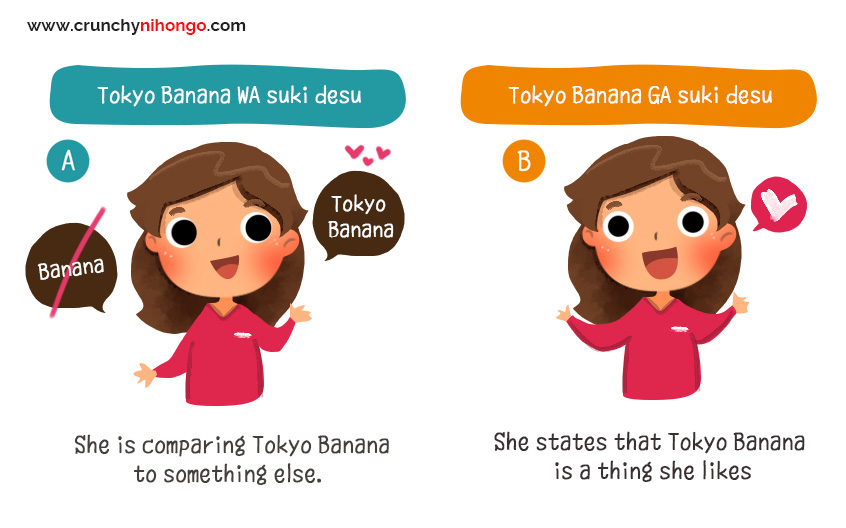 The sentence you hear might not be the full version because there is sentence she removes to make sure she isn’t rude or hurt your feelings. What she might be really saying is… Banana WA suki janai desu. Tokyo Banana WA suki desu. Literally means “About banana, i don’t like it. About Tokyo Banana, i like it”.
The sentence you hear might not be the full version because there is sentence she removes to make sure she isn’t rude or hurt your feelings. What she might be really saying is… Banana WA suki janai desu. Tokyo Banana WA suki desu. Literally means “About banana, i don’t like it. About Tokyo Banana, i like it”.
In case B, you accidentally gave her a Tokyo Banana without knowing that she like it. She gets excited and says to you “I like Tokyo Banana!”, stressing that Tokyo Banana is a thing she likes.
…………………………………………
Example B :
A: Ame WA furimasu.
B: Ame GA furimasu.
*Ame is rain, Furimasu is masu verb form of fall as in rain.
By it’s own, A is grammatically incorrect. But again, we might faced with an incomplete sentence. The situation might be like this… Imagine that you and your Japanese friend watch the morning news and it is said that it is going to snow in the afternoon.
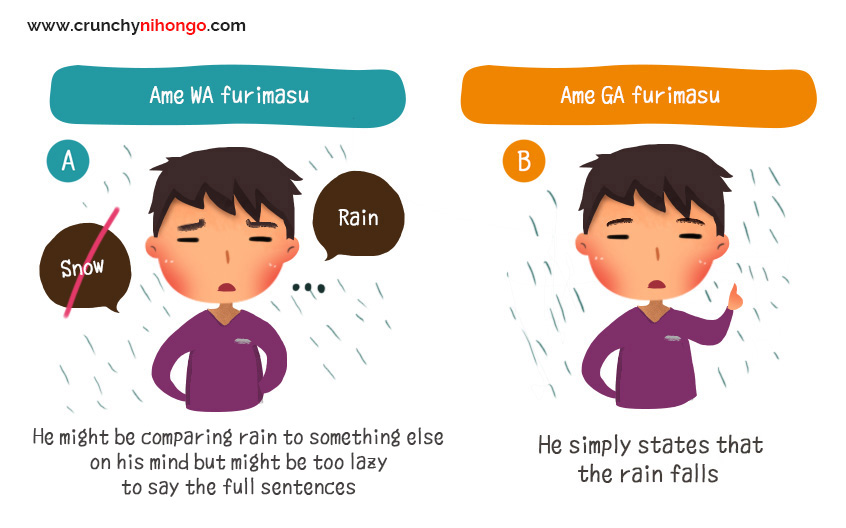 In the afternoon, instead of snow falling, it’s raining instead! Therefore your Japanese friend sigh while saying “Yuki WA furimasen… Ame WA furimasu…” Which literally translated as “About snow, it doesn’t fall. About the rain… it falls”. In this case WA is okay because the WA is being used to compare 2 topics. Snow and rain.Your friend might be lazy to say the snow part so you don’t hear it…
In the afternoon, instead of snow falling, it’s raining instead! Therefore your Japanese friend sigh while saying “Yuki WA furimasen… Ame WA furimasu…” Which literally translated as “About snow, it doesn’t fall. About the rain… it falls”. In this case WA is okay because the WA is being used to compare 2 topics. Snow and rain.Your friend might be lazy to say the snow part so you don’t hear it…
In conclusion,with only “Ame WA furimasu.” It literally means: “About rain, it falls…” but it is said with a thought that “there might be other things that fall as well beside rain”
In B, it’s straightforward. It suddenly rain and your friend notify you by saying “Ame GA furimasu”. Which literally means “Rain falls”.
…………………………………………
Case & Explanations B: When Particle WA and GA being used together or doubled.
…………………………………………
Case 1: …Particle WA continued with…Particle GA
A: Banana WA John GA suki desu.
B: John WA Banana GA suki desu.
A literally means “About Banana, John is the one who likes it”. The topic is Banana.
While B literally means “About John, Banana is the thing he likes”. The topic is John.
Both contexts are the same, so in English both are literally translated as “John likes Banana”.
Useful notes Although Japanese words are like lego block and can be jumbled if the word has been connected with correct particle, note it is unnatural to say:
X [John GA] [Banana WA] [suki desu].
It’s because John Ga suki desu is actually one block. so you can say:
[John GA suki desu], [Banana WA].

It’s like you’re saying “John like it! The banana…”. Check out illustration above to see the block of sentence.
…………………………………………
Case 2: Double Particle WA
A: Banana WA John WA suki desu.
B: John WA Banana WA suki desu.
In this case, the first WA is highly likely to be a topic marker. And the second WA is used to compare more than one topics.
A literally means “As for banana…, about John, (I know) he likes it”. It implies that there might be other people besides John that like banana but the speaker is unsure.
B literally means “As for John…, about banana, (I know) he likes it”. It implies that there might be other fruits that John likes but the speaker is unsure.
Both contexts have subtle additional informations, but in English it might be translated as “John likes banana” and thus create confusions. A better translation might be “Banana…, John likes it…” or “John…, he likes banana…” Implying a bit uncertainty or hesitation.
…………………………………………
Wheeewww, That’s a lot!
But we hope it helps clear up many confusions about wa & ga without you getting more confused. Again, don’t overstressed about this matter.
Happy learning!
。゚✶ฺ.ヽ(*´∀`*)ノ.✶゚ฺ。
…………………………………………
Quick links: To the Top | Check out Japanese FAQ posts for more answers to common questions like this one | Ask or Send Feedbacks via Instagram | Easy Japan Lessons Index

I would like to say “it seems Barca are going to win the league again”. In this situation, what should you use “wa” or “ga”?
You can use both 😀 But “Ga” would make it sound direct. While “Wa” make Barca as a topic so it’s less direct 😀